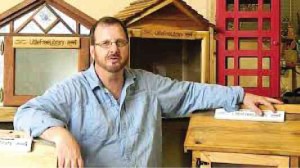You won’t need much: Books, of course, a small structure outdoors to house them and a willingness to share with others.
People have used everything, from birdhouses to phone booths to newspaper racks, posting them everywhere—from windows to front yards to gardens—to get their book exchanges started.
The early libraries were 20 inches wide by 15 inches deep by 18 inches high, but you are not bound to such dimensions. You can be as imaginative as you want with the design of your book box. Just make sure the structure is sturdy and weather-proof. Wet books are of no use to anyone.
If you’re no handyman, or you’re simply itching to open your Little Free Library (LFL), ready-made wood libraries may be purchased online from littlefreelibrary.org.
Once your DIY library is up, you can register it with the original Little Free Library in Hudson, Wisconsin. This will cost you $34.95 (plus $3.50 for shipping and
If you want, you can register your library to be on the LFL map. As part of the global LFL community, you’ll be eligible for free book donations, according to the LFL website.
People who host LFLs in their communities are called “stewards.” They make sure the books are in good condition. They check that the box is not empty. And they see to it that the books are not carted wholesale by thieves who want to sell them to used-book resellers.
The library hut in Barangay Tangke in Talisay in the story above is to date the only LFL in the Philippines. Every barangay needs one, if not more. So let’s get going.
Love started it
The story of the Little Free Library can be told like a book.
The dedication page will say that Todd Bol built the very first LFL to honor his schoolteacher-mother when she passed away.
The contents will be the stories from the stewards around the world who have built their own LFLs for various reasons. Some are book lovers and storytellers themselves. Others have crafted mini libraries as gifts for people they love. Some are empty-nesters or people living alone who want to connect with their neighbors.
In 2009, when Bol stocked the first LFL with his own books and attached a sign that said “Free Books,” he had no idea that so many people in so many countries would be interested in his itsy-bitsy library.
In the LFL’s early days, he would build the tiny structures himself and give them away. But the requests kept coming and he soon needed more funds, if not a partner. Enter Rick Brooks, a community development educator at the University of Wisconsin. It became their partnership’s mission to spread the community-based literacy movement globally.
“It is my hope to help create a positive grassroots movement around literacy, books and community in the Philippines that emulates what we started in the US,” Bol told the Inquirer when he recently stopped in Manila on his way to a speaking engagement in Japan.
There are a couple of other things he hopes to do. Wouldn’t it be nice, he said, if people would start their conversations with “Whatcha readin’?” instead of just saying “Hello”? Another dream of his is for the LFLs to be more successful than McDonald’s so that one day he can say, “Billions and billions read.”
Community book exchange
Once you have your LFL up, tell friends and neighbors that anyone can take a book from it, and share a book as well. In other words, “take a book, leave a book.” Let the community know that they can read a book, return it or pass it on to another person, and they can donate some of their own books, too, especially those that readers of all ages may enjoy. Your LFL will not require full-time minding. Since it’s for everyone, it goes without saying that everyone should look after it. Visit littlefreelibrary.org.
